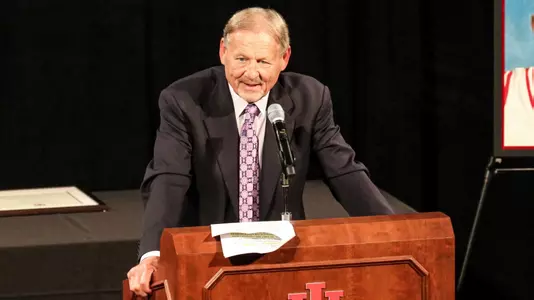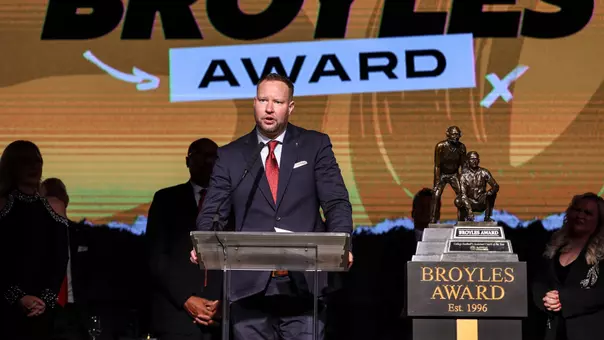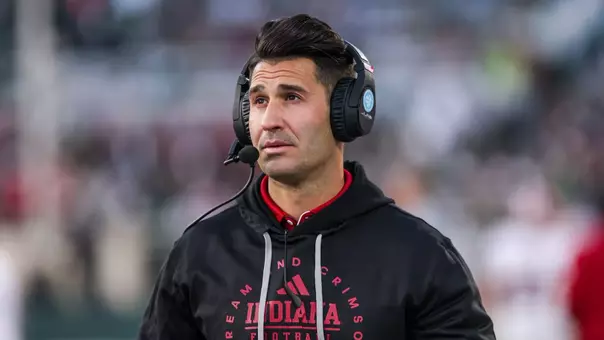Indiana University Athletics

NFF Awards Spotlight: 2022 NFF Schenkel Award Recipient Don Fischer
12/6/2022 3:00:00 PM | Football
After graduating high school, Don Fischer knew what he did not want to do. He had experienced several unfulfilling jobs, including selling magazines door-to-door and turning scraps into fertilizer at a meat packing plant. It would be an ad in the back of a magazine that would set the course for a voice to become an iconic IU tradition, rivaling the school's famed candy-striped pants.
"I always knew that I wanted to do something with sports, but I had no idea what," said Fischer. "I had about seven or eight jobs my first year out of high school, and I ended up getting a night shift job with the railroad selling tickets… I'm sitting in the depot reading during my break, and there's this huge ad for a sportscasting school, and I said: 'Man, I think that's exactly what I want to try and do.'"
The aspiring sportscaster took the bait, spending $845 for the home correspondence course and receiving 20 vinyl records and a $29 tape recorder. He began his course work, supplementing it by shadowing the talent as a gofer at the local radio station, WGLC, in Mendota, Illinois.
Fischer's tenacity and knack for building relationships paid dividends when he tracked down one of his WGLC mentors, Chuck Kenworthy, in Butte, Montana. Kenworthy told Fischer about an opening, and the 20-year-old traveled 48-hours by train for an in-person interview. The trip paid off, and Fischer took a job working the night shift as an announcer at the Butte station.
After 15 months and limited opportunities for sportscasters in Montana, Fischer returned to Mendota, resuming his railroad job as he looked for his big break. Without any play-by-play experience, Fischer overstated his resume to a desperate general manager at a station in Ottawa, Illinois. He had landed his first sportscasting job, but his first game was a disaster. The duped general manager gave Fischer three weeks to improve.
"I said, 'I've got to do something to change this whole scenario fast, or I'm going to be in real trouble,'" Fischer recalled. "I decided I'm going to call Art Kimball, who I'd never talked to but was a tremendous play-by-play guy in the next town."
The veteran Kimball took heart, giving the upstart Fischer five hours of his time on a Sunday after church. Kimball covered spotting charts, tracking statistics, pregame interviews and everything needed to prepare for a game.
"I took copious notes that day, and I have not changed a thing in 56 years," said Fischer. "I've prepared for games the same way all these years. But those five hours changed everything. I could never thank Art Kimball enough for what he did for me."
In 1973, WIRE-Radio in Indianapolis had obtained the rights to be the first exclusive network of IU sports, and they needed a sportscaster to call the games. At the age of 26, Fischer, who was doing more than 175 play-by-play games a year, fit the bill, beginning a 50-year run, which continues to this day and has included more than 2,100 games and 565 football games.
"Don Fischer is the best and an IU icon," said Scott Dolson, IU Vice President and Director of Intercollegiate Athletics. "There are so many iconic moments that he described for IU fans, and the way he did it makes IU fans have the hair on the back of their necks stand up and get goosebumps… He just brings IU fans together. He's just been that common thread."
Fischer's first year was Bob Knight's third year, and he would cover the basketball legend for the next 27. Fischer's first year also coincided with Lee Corso's first season as the head football coach. Fischer recalled a favorite memory during Coach Corso's Sunday TV show after a big loss to Nebraska. The show began with candles and flowers around a coffin, and Coach Corso pops up out of the casket, saying: "We ain't dead yet."
"It was one of the funniest things," said Fischer. "He was made for television and radio because he had this incredible personality…. Coach Corso loved his players. They loved him and playing for him… They only had two winning seasons in his 10, but he always made it fun."
Fischer's list of legendary calls spans the decades, including the final seconds of the final game of the 1976 undefeated basketball season. Austin Starr's game winning field goal against Purdue in 2007, which sent IU and Coach Bill Lynch to the Insight Bowl, provides a special gridiron memory. Lynch had succeeded the late Coach Terry Hoeppner who had lost his battle to brain cancer.
"All the kids wanted to win for Terry Hoeppner, and they did," said Fischer. "They finished 7-5, beating archrival Purdue in the last game of the season on a field goal with about 20 seconds. It was about the most emotional I think I've ever been about a football game. There were tears coming down my face."
Other treasured football moments occurred during 1987 when IU beat Ohio State, 31-10, in Columbus, and then Michigan, 14-10, in a driving rainstorm at home. Future Hall of Fame coaches Earle Bruce and Bo Schembechler were on the respective opposing sidelines.
"Those two wins were probably as emotional football victories for Indiana fans in my career because they had never beaten Michigan and Ohio State in the same year," said Fischer.
For his first 24 years, Fischer worked alongside color analyst Max Skirvin, who retired after the 1997 season, followed by Buck Suhr, Dan Thompson, Pete Compise, Suhr again and now with Rhett Lewis.
"I've never thought I was the best play-by-play guy or the best voice, but I think people who have listened to our broadcasts have been entertained." said Fischer, who has been named the state's Sportscaster of the Year 31 times. "I've had great analysts and people to work with through the years, and they've made our broadcast as good as it can be."
"I always knew that I wanted to do something with sports, but I had no idea what," said Fischer. "I had about seven or eight jobs my first year out of high school, and I ended up getting a night shift job with the railroad selling tickets… I'm sitting in the depot reading during my break, and there's this huge ad for a sportscasting school, and I said: 'Man, I think that's exactly what I want to try and do.'"
The aspiring sportscaster took the bait, spending $845 for the home correspondence course and receiving 20 vinyl records and a $29 tape recorder. He began his course work, supplementing it by shadowing the talent as a gofer at the local radio station, WGLC, in Mendota, Illinois.
Fischer's tenacity and knack for building relationships paid dividends when he tracked down one of his WGLC mentors, Chuck Kenworthy, in Butte, Montana. Kenworthy told Fischer about an opening, and the 20-year-old traveled 48-hours by train for an in-person interview. The trip paid off, and Fischer took a job working the night shift as an announcer at the Butte station.
After 15 months and limited opportunities for sportscasters in Montana, Fischer returned to Mendota, resuming his railroad job as he looked for his big break. Without any play-by-play experience, Fischer overstated his resume to a desperate general manager at a station in Ottawa, Illinois. He had landed his first sportscasting job, but his first game was a disaster. The duped general manager gave Fischer three weeks to improve.
"I said, 'I've got to do something to change this whole scenario fast, or I'm going to be in real trouble,'" Fischer recalled. "I decided I'm going to call Art Kimball, who I'd never talked to but was a tremendous play-by-play guy in the next town."
The veteran Kimball took heart, giving the upstart Fischer five hours of his time on a Sunday after church. Kimball covered spotting charts, tracking statistics, pregame interviews and everything needed to prepare for a game.
"I took copious notes that day, and I have not changed a thing in 56 years," said Fischer. "I've prepared for games the same way all these years. But those five hours changed everything. I could never thank Art Kimball enough for what he did for me."
In 1973, WIRE-Radio in Indianapolis had obtained the rights to be the first exclusive network of IU sports, and they needed a sportscaster to call the games. At the age of 26, Fischer, who was doing more than 175 play-by-play games a year, fit the bill, beginning a 50-year run, which continues to this day and has included more than 2,100 games and 565 football games.
"Don Fischer is the best and an IU icon," said Scott Dolson, IU Vice President and Director of Intercollegiate Athletics. "There are so many iconic moments that he described for IU fans, and the way he did it makes IU fans have the hair on the back of their necks stand up and get goosebumps… He just brings IU fans together. He's just been that common thread."
Fischer's first year was Bob Knight's third year, and he would cover the basketball legend for the next 27. Fischer's first year also coincided with Lee Corso's first season as the head football coach. Fischer recalled a favorite memory during Coach Corso's Sunday TV show after a big loss to Nebraska. The show began with candles and flowers around a coffin, and Coach Corso pops up out of the casket, saying: "We ain't dead yet."
"It was one of the funniest things," said Fischer. "He was made for television and radio because he had this incredible personality…. Coach Corso loved his players. They loved him and playing for him… They only had two winning seasons in his 10, but he always made it fun."
Fischer's list of legendary calls spans the decades, including the final seconds of the final game of the 1976 undefeated basketball season. Austin Starr's game winning field goal against Purdue in 2007, which sent IU and Coach Bill Lynch to the Insight Bowl, provides a special gridiron memory. Lynch had succeeded the late Coach Terry Hoeppner who had lost his battle to brain cancer.
"All the kids wanted to win for Terry Hoeppner, and they did," said Fischer. "They finished 7-5, beating archrival Purdue in the last game of the season on a field goal with about 20 seconds. It was about the most emotional I think I've ever been about a football game. There were tears coming down my face."
Other treasured football moments occurred during 1987 when IU beat Ohio State, 31-10, in Columbus, and then Michigan, 14-10, in a driving rainstorm at home. Future Hall of Fame coaches Earle Bruce and Bo Schembechler were on the respective opposing sidelines.
"Those two wins were probably as emotional football victories for Indiana fans in my career because they had never beaten Michigan and Ohio State in the same year," said Fischer.
For his first 24 years, Fischer worked alongside color analyst Max Skirvin, who retired after the 1997 season, followed by Buck Suhr, Dan Thompson, Pete Compise, Suhr again and now with Rhett Lewis.
"I've never thought I was the best play-by-play guy or the best voice, but I think people who have listened to our broadcasts have been entertained." said Fischer, who has been named the state's Sportscaster of the Year 31 times. "I've had great analysts and people to work with through the years, and they've made our broadcast as good as it can be."
FB: Curt Cignetti Media Availability (1/17/26)
Saturday, January 17
FB: Curt Cignetti Media Availability (1/16/26)
Friday, January 16
FB: CFP National Championship Game - Student-Athlete Press Conference
Tuesday, January 13
FB: Curt Cignetti Media Availability (1/12/26)
Monday, January 12




